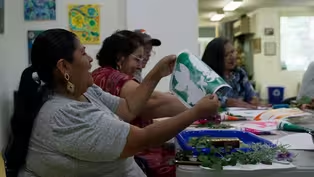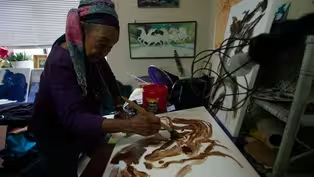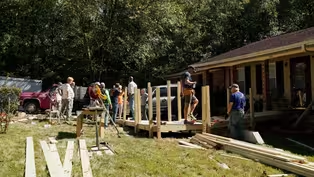
Inside North Carolina’s $10 Billion Unpaid Caregiving Crisis
Clip: 2/28/2025 | 6m 49sVideo has Closed Captions
See the stories and solutions behind the growing dementia care crisis.
Every day, millions of Americans face an impossible choice: hire expensive care for their loved ones with dementia or become unpaid caregivers themselves. In North Carolina alone, over 360,000 family members provide care worth $10 billion. Meet families navigating this challenge and discover how new programs like the Caregiver Academy in New Hanover County are offering hope and support.
Problems playing video? | Closed Captioning Feedback
Problems playing video? | Closed Captioning Feedback
ncIMPACT is a local public television program presented by PBS NC

Inside North Carolina’s $10 Billion Unpaid Caregiving Crisis
Clip: 2/28/2025 | 6m 49sVideo has Closed Captions
Every day, millions of Americans face an impossible choice: hire expensive care for their loved ones with dementia or become unpaid caregivers themselves. In North Carolina alone, over 360,000 family members provide care worth $10 billion. Meet families navigating this challenge and discover how new programs like the Caregiver Academy in New Hanover County are offering hope and support.
Problems playing video? | Closed Captioning Feedback
How to Watch ncIMPACT
ncIMPACT is available to stream on pbs.org and the free PBS App, available on iPhone, Apple TV, Android TV, Android smartphones, Amazon Fire TV, Amazon Fire Tablet, Roku, Samsung Smart TV, and Vizio.
Providing Support for PBS.org
Learn Moreabout PBS online sponsorship- Millions of Americans are living with Alzheimer's and with a generation of Baby Boom seniors coming up, that number is only expected to rise.
So who will take care of these seniors?
Well, in most cases, it's not the healthcare system or trained professionals.
It's family members, unpaid family members.
In North Carolina alone, it took over 360,000 family members to provide care for their loved ones with dementia.
And if we had to put a price tag on that unpaid family labor, it would exceed a staggering $10 billion.
So why are families dealing with this enormous burden and what's being done to help them?
I'm David Hurst.
This is "ncIMPACT."
[upbeat music] For many families, the journey into dementia care begins with uncertainty, a series of small moments that hint at something bigger.
For Mark Wilde-Ramsing, watching his wife Dina's memory gradually slip away would become an 11-year journey.
During the last five years, caring for Dina would be Mark's full-time job.
- It's a daunting task when you're coming into it and you don't know what you're doing.
- [David] Mark's story is becoming increasingly common across America.
Today, nearly 7 million Americans are living with Alzheimer's, and by 2050, that number is expected to double.
So who steps in to provide care for this growing population?
Well, it'll likely be family members, like Mark.
The challenge of caregiving is that it is 24/7.
You're always on call.
- [David] In fact, for those with dementia, 83% of care in the United States is provided by unpaid family members.
That's parents and children taking on rules they never expected.
[dramatic music] But how did we get here?
You see, our system for long-term care hasn't really changed much since Medicare and Medicaid began in 1965.
But America has changed dramatically.
Baby Boomers are now reaching retirement age, creating the largest elderly population in our nation's history, and they're living longer.
Our current system just isn't built for this reality.
Insurance costs are skyrocketing.
There's a shortage of care workers.
And assisted living facilities?
They're becoming too expensive for most middle class families.
The result is a patchwork of services that leaves most families struggling to find and afford the care they need.
Caring for someone with dementia can feel like navigating unchartered waters.
That's where the Caregiver Academy steps in.
The Academy serves the one-stop resource hub in the Wilmington area.
They offer everything from educational programs, to support groups.
[gentle music] - To make anything easier for caregivers, their jobs are already hard enough, and if we can have that central location or that when they call one of our agencies, they get all the resources in one place, instead of having to call a lot of different agencies to get that information.
- [David] One of their most popular programs is the Memory Cafe.
It's a social gathering where caregivers and their loved ones can connect with others facing similar challenges.
For couples like Mike and Bonnie Oliver who have been married for 47 years, they say these programs appeared just when they needed them the most.
After Mike's diagnosis two years ago, Bonnie found herself navigating a brand new role, caregiver to her husband.
- It socializes you- - Mm-hmm.
- And it socializes me too and I'm starting to see faces who may be in another group, but it's just a good thing for everybody.
- What about for you, Mike?
What does getting in a room like this mean to you?
- I agree with Bonnie.
I think it's affirmation that what I see myself doing is not unusual for my disease, my affliction, and I appreciate so much her patience.
I think the first thing about this affliction is accepting it.
- [David] But even with support systems in place, the weight of caregiving takes its toll.
A recent survey found that nearly 60% of those caring for loved ones with Alzheimer's report being under extreme stress.
It's something Mark Wilde-Ramsing learned through experience.
- It's like when you're on the airplane and oxygen goes out, you put your mask on first.
The caregiver has to stay healthy.
- [David] That's where Project CARE comes into play.
It stands for Caregiver Alternatives to Running on Empty, and it's a state-funded program that operates across North Carolina.
The local Area Agency on Aging administers these funds across 12 counties.
They provide family consultants who help caregivers access resources and temporary respite care.
- Caregiving can be a very lonely job, you know, especially if you take it on all yourself.
I find sometimes caregivers have a hard time reaching out and asking for help, so that's where we try to help them when they call us.
- [David] But there's another stressor that could be relieved, and that's the financial burden.
Think about either the cost of paying for expensive care or even quitting your job to care for one of your parents, because caring for someone with dementia comes with a hefty price tag, nearly $400,000 over their lifetime.
And family caregivers shoulder about 70% of this burden through unpaid care and out-of-pocket costs.
This time the solution is at the federal level.
In the summer of 2025, Medicare is rolling out an eight-year pilot project to directly support dementia caregivers.
It's a first for the federal health insurance program for seniors.
The idea is to invest in caregivers to keep dementia patients healthier and happier at home, while also preventing families from burning out emotionally and financially.
Medicare's betting this approach will pay off in the long run.
[crowd clapping] [gentle music] [shoes tapping] [shoes tapping] Behind all these programs and initiatives are real families facing both heartbreak and hope.
For Mark Wilde-Ramsing, his wife passed away in October of 2023.
Through 11 years of caring for her, he discovered that even in the toughest moments, support could make all the difference.
- There are so many good times and loving moments that I had throughout my wife's illness, even to the very end that just makes my heart sore because we were able to enjoy them and not be so mad and so distraught.
- [David] And as more families face this journey, the hope is that a tapestry of resources woven from local, state and federal initiatives will empower caregivers to navigate this road with greater confidence.
[shoes tapping] [crowd applauding] For "ncIMPACT," I'm David Hurst.
Video has Closed Captions
Preview: 2/28/2025 | 20s | As senior populations soar, a new generation designs innovative solutions for elder care statewide. (20s)
The Surprising Cure for America's Loneliness Crisis
Video has Closed Captions
Clip: 2/28/2025 | 6m 50s | Doctors and artists team up to fight senior isolation through a novel healthcare approach. (6m 50s)
This Program Helps Seniors Live at Home on Their Own Terms
Video has Closed Captions
Clip: 2/28/2025 | 7m 54s | A unique partnership in North Carolina is revolutionizing how seniors can safely age in their homes. (7m 54s)
Providing Support for PBS.org
Learn Moreabout PBS online sponsorship
- News and Public Affairs

Top journalists deliver compelling original analysis of the hour's headlines.

- News and Public Affairs

FRONTLINE is investigative journalism that questions, explains and changes our world.












Support for PBS provided by:
ncIMPACT is a local public television program presented by PBS NC


